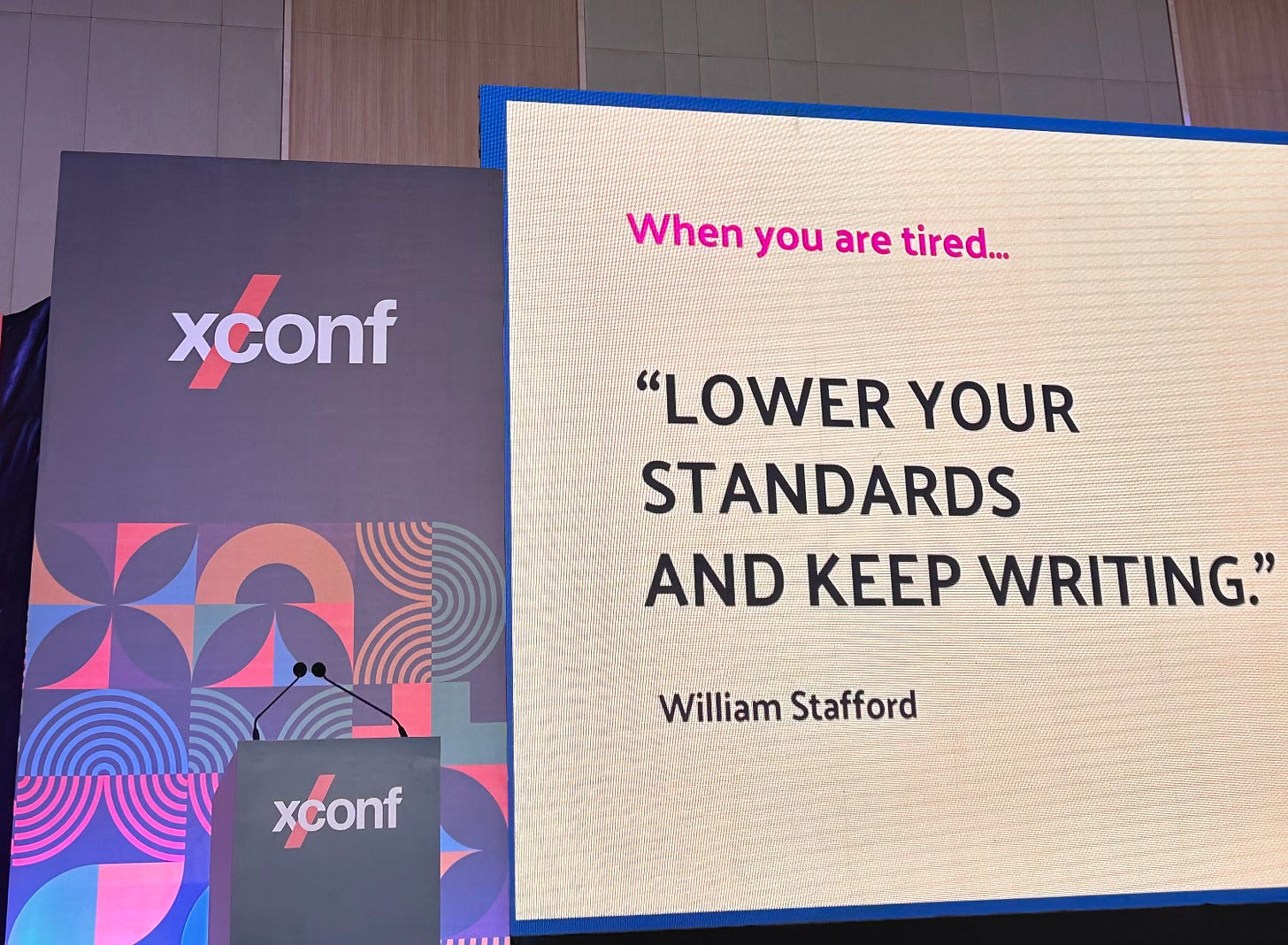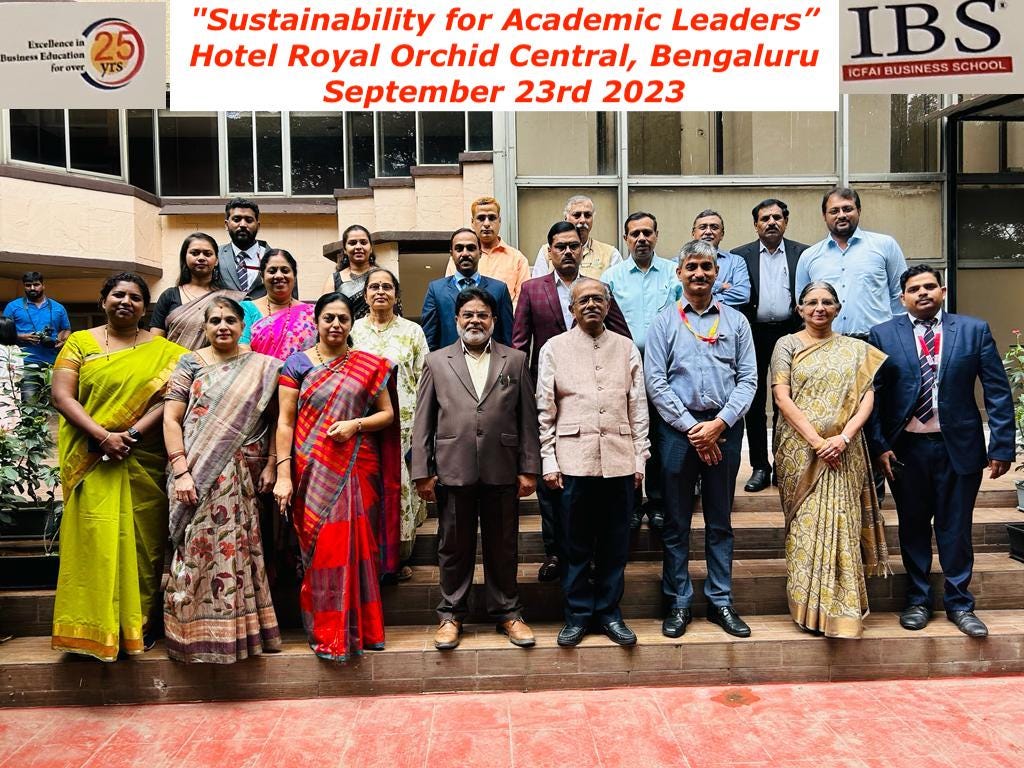Unlocking WEALTH from WASTE
Platforms and Waste Management
In today's newsletter on waste management, we begin with a dive into the fascinating intersection of tradition and environmental responsibility. Ganesh Puja, a cherished celebration in India, has evolved beyond religious devotion.
It now stands as a symbol of sustainable festivities, highlighting the pressing need for eco-friendly practices. In this spirit, many communities have taken a remarkable steps by celebrating Ganesh Puja with pandals crafted from bamboo, mud and other sustainable material , demonstrating a commitment to preserving tradition while embracing eco-consciousness.
More power to such commitment and endeavours.
Do share your feedback on this newsletter if you have not done it yet.
If you are reading for the first time, please subscribe for a weekly email discussing Running Platform Marketing Life.
AND if you are a friend of the RPML, do share it with others. You can add more of your friends to the Community of Platform’ed by using the following link.
DTW
During the Week, I attended XConf India organised by ThoughtWorks India. During the day, we heard insightful keynotes from thought leaders and an agenda rich with a wide range of topics, including engineering effectiveness, AI, Data Mesh, sustainable tech, design patterns, digital transformation and much more.
One of the breakout session has a presentation on “Lessons learned when building sustainable solutions for startups” by Natasha Menon, Lead Data Analyst and Mehak Kharbanda, Lead Project Manager, Thoughtworks. They shared their experience helping build a platform to measure carbon emissions. Using custom artificial intelligence (AI) and machine learning (ML) models, the Terrascope platform automates cumbersome and error-prone steps by ingesting, categorizing and matching business activity data with relevant emission factors.
Let us explore the critical intersection of climate action, sustainable development, and waste management. While climate action involves mitigating the adverse effects of climate change through conscious efforts to reduce carbon emissions and adopt eco-friendly practices, we have to understand that waste management plays a pivotal role in this context, as efficient waste handling and recycling are fundamental steps toward a greener and more sustainable world. We can understand the intersection of platforms and waste management though the WEALTH Acronym- Waste Segregation Simplified; Efficient Collection and Logistics; Awareness and Education; Localized Recycling Hubs; Tracking and Monitoring and Hazardous Waste Disposal
W - Waste Segregation Simplified: Digital platforms streamline waste segregation at the household level by providing easy-to-follow guidelines, virtual assistants, and real-time feedback. "BinTix," a platform used in my residential community in Hyderabad offers households an accessible and user-friendly solution for waste segregation. Through this platform, users receive guidance on effectively separating their waste into different categories like recyclables, organics, and non-recyclables. The platform not only simplifies the segregation process but also educates users about the importance of proper waste disposal. By encouraging households to segregate waste at the source, BinTix contributes to reducing the burden on landfills and promoting recycling.
E - Efficient Collection and Logistics: Platforms optimize waste collection routes and schedules for communities, reducing costs and environmental impact. Platforms can accumulates data on waste generation, collection, and disposal. This data is analyzed to improve waste management strategies, optimize collection routes, and reduce operational costs.
A - Awareness and Education: Digital tools facilitate awareness campaigns, workshops, and online resources, educating communities about waste management best practices. The "Swachh Bharat Mission" and various initiatives like Swachhata Pakhwada in India leverages digital platforms to enhance waste collection efficiency in schools. By implementing a digital system, the initiative optimizes collection schedules, routes, and logistics. This efficiency reduces transportation costs and the carbon footprint associated with waste collection. Furthermore, it promotes cleanliness and hygiene in educational institutions, instilling good waste management practices in the younger generation.
L - Localized Recycling Hubs: Platforms connect local recycling centers with households and businesses, promoting a circular economy. "ReCykal" is an Indian platform that connects local recycling centers with businesses and other stakeholders. They also facilitates the responsible disposal and recycling of electronic waste (e-waste). By using this platform, brands and organizations can ensure that their waste products are recycled properly, preventing hazardous materials from entering landfills and promoting a circular economy.
T - Tracking and Monitoring: Real-time tracking of waste generation and collection data enables informed decision-making and resource allocation. "SmartBin," an innovative platform, utilizes the Internet of Things (IoT) technology to monitor waste bin fill levels in real-time. These smart bins are equipped with sensors that transmit data to a centralized system. Waste collection teams can then optimize their routes based on which bins need emptying, significantly improving collection efficiency. This technology not only reduces operational costs for waste management but also minimizes the environmental impact of unnecessary collections.
H - Hazardous Waste Disposal: Platforms ensure proper disposal of hazardous waste by connecting businesses with authorized disposal services.For industries dealing with hazardous waste in India, "mJunction" provides a platform to connect with authorized hazardous waste disposal services. They have successfully helped industries dispose-off their hazardous wastes worth more than ₹ 140 Crores in last five years. This ensures that businesses adhere to strict regulations regarding the safe and compliant disposal of hazardous materials. Such platforms plays a crucial role in maintaining environmental integrity and public health by preventing the improper disposal of hazardous waste.
The WEALTH framework (Waste Segregation Simplified, Efficient Collection and Logistics, Awareness and Education, Localized Recycling Hubs, Tracking and Monitoring, and Hazardous Waste Disposal) highlights the pivotal role of digital platforms in waste management. These platforms simplify waste segregation, optimize collection logistics, promote awareness, foster recycling, enable real-time tracking, and ensure proper hazardous waste disposal, contributing to a greener and more sustainable future.
OTW
Over the Weekend, I spoke about sustainability at the Regional Principals’ Meet organised by Icfai Business School, Bengaluru. Thanks to Prof G V Muralidhara, Director-Icfai Business School, Bengaluru for organising the event and creating a platform for the academic leadership to come together to brainstorm on including sustainability in teaching, research and practice in higher education.
My gratitude to all the liberal arts and engineering college principals who actively participated in this event. Their dedication to sustainability in education is truly commendable, and their presence reflected a shared commitment to positive change and re-emphasise the critical role that sustainability plays in education. We delved into the significance of integrating sustainability into curricula, campus initiatives, and research endeavors. It's clear that sustainability is not just an aspiration; it's an imperative. Our discussions underscored the importance of holistic education that nurtures a deep understanding of environmental, social, and economic challenges and I was truly inspired by the diverse perspectives and expertise in the workshop.
I would request my other academic colleagues to embrace sustainability as an integral part of educational institutions, not just as a subject but as a guiding principle. Let's continue to explore innovative ways to engage our students, foster community involvement, and conduct meaningful research that contributes to a more sustainable future. Our actions as academic leaders can shape the attitudes and behaviors of future generations.
Just a gentle reminder, There is no “PLAN”et B.
I Love You
Shailendra
OTM
Opportunities through MountainSpeak are available for Lifelong Fight Lazy Run Hyderabad with Milind Soman.
To participate, simply register here for INR 299:
Hyderabad, get ready to lace up your running shoes because the Lifelong Fight Lazy Run is coming to your city! 💥
📅 Date: 7th October 2023, Saturday
⏰ Time: 06:00 AM
📍 Location: Gachibowli Stadium, Hyderabad
This event is all about breaking through barriers and promoting an active lifestyle. Here's what's in store for you:
👕 Free Lifelong Fight Lazy T-Shirt
🏅 Medals and Prizes
⚡Post-Run Refreshments
📜 E-Certificate for Participation






I could recollect one such example “Phool”, the incense sticks company. They are providing a lean solution to the monumental temple-waste problem. They collect tons of floral-waste from temples in UP on a daily basis. These sacred flowers are then handcrafted into charcoal-free incense, biodegradable packaging material through their ‘Flowercycling’ technology.
From sustainability being a topic in "Board Rooms", to actually having "Sustainable Bappa", we have come a long way!